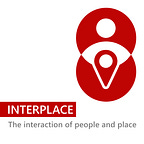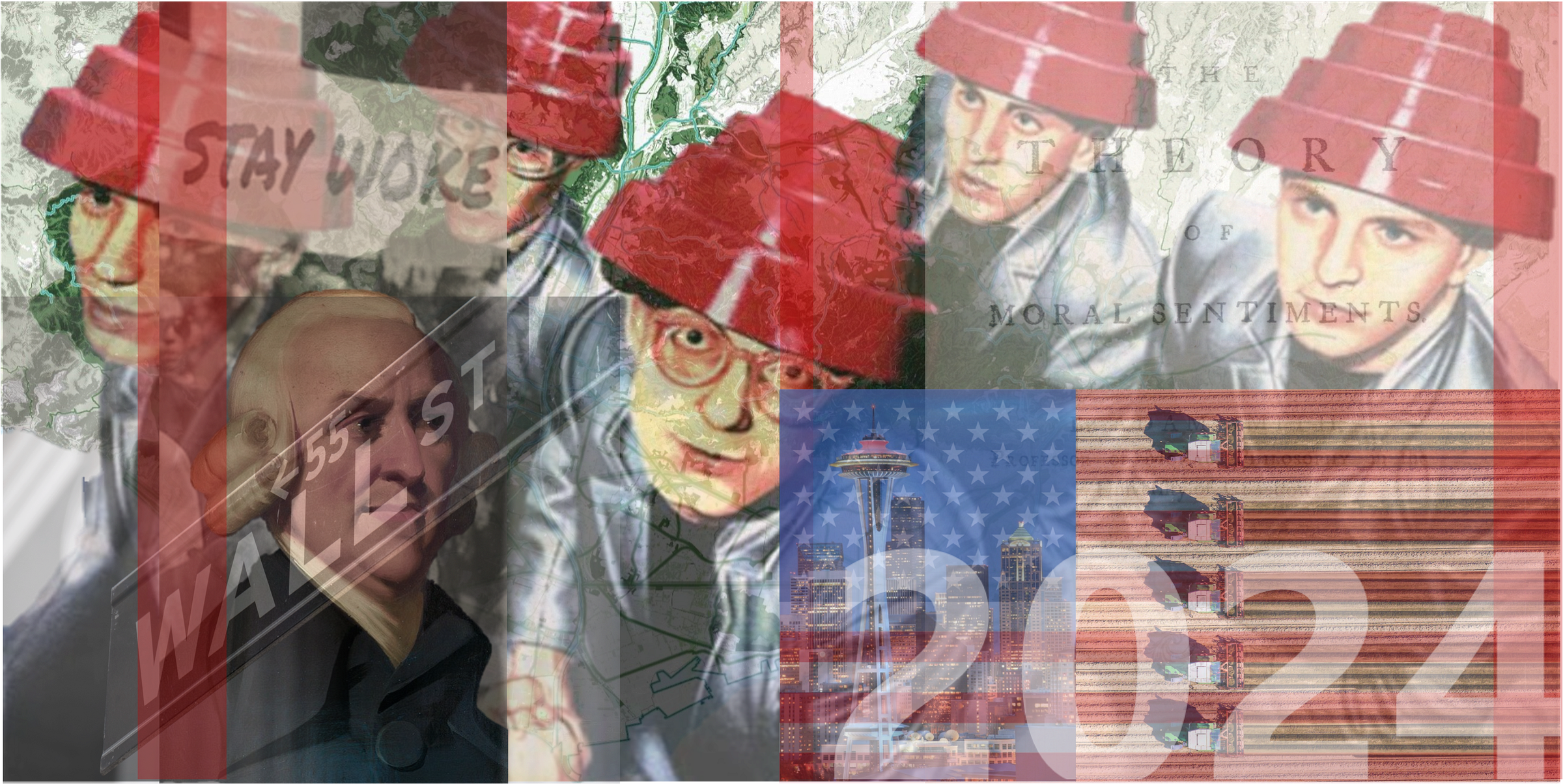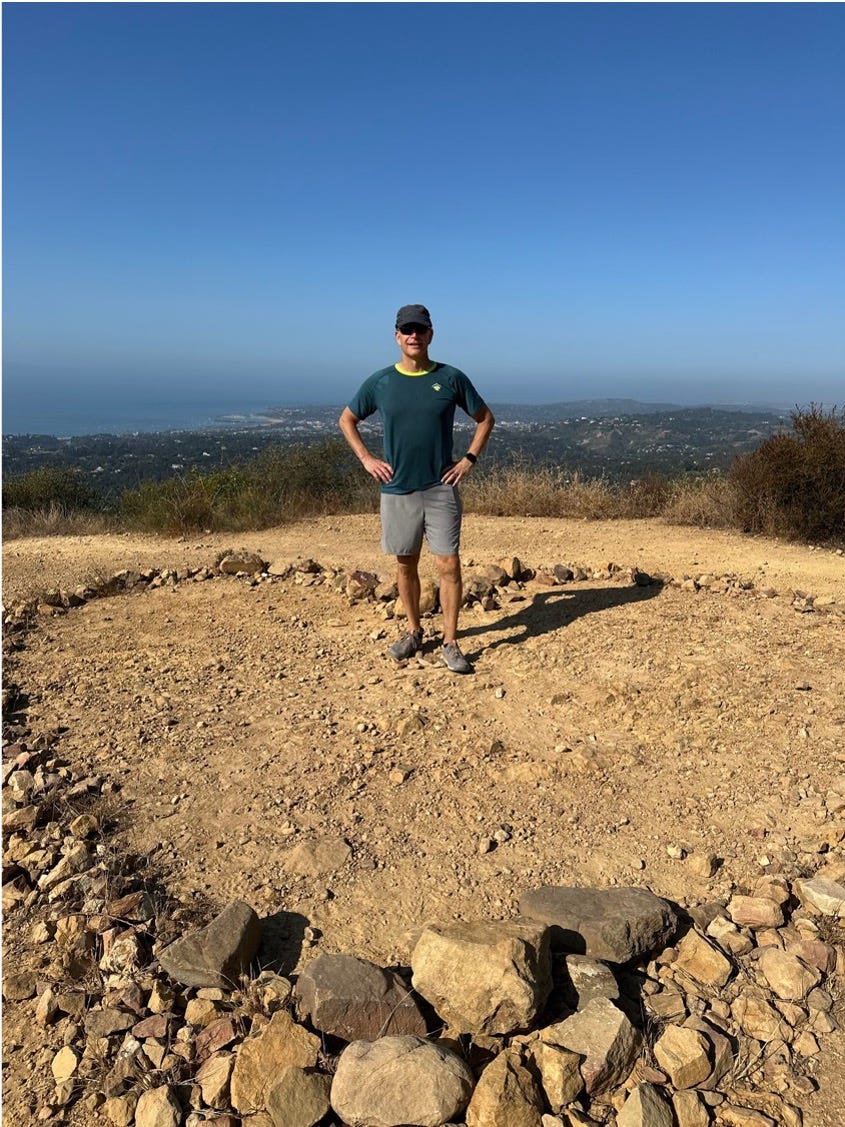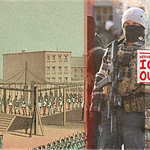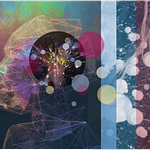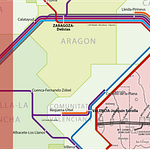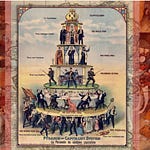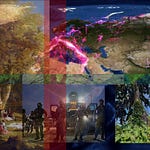Hello Interactors,
As the year ends, I reflect on 2024’s top five essays and a shared theme emerges: the systems that define our lives. These systems intertwine nature and nurture, machines and morality, and markets and minds.
From evolution’s harmony to the moral balance of economic power, the co-opting of language to the divides between prosperity and precarity, our journey has revealed deep connections between people, place, and power.
Let’s rewind and reweave these connections into a broader narrative that sets us on our way to another trip around the sun.
NATURE, NURTURE, AND NODAL NETWORKS
In “DEVO, Darwin, and the Evo-Devo Dance,” we explored how evolution reflects the eternal interplay between biology and environment, progress and adaptation. The evolution of synthesizers — as my daughter’s playful experiments with sound reminded me — offers a metaphor for humanity’s relationship with technology.
This relationship echoes the broader theme of systems and evolution. Iterative changes and interactions between tools and users offer the potential to create new possibilities. As noted in the essay,
"DEVO’s fusion of human and machine echoes these evolutionary dynamics, where both biological and technological systems evolve through reconfiguration and integration, creating emergent complexity that Darwin could not have imagined."
Just as synthesizers blend natural sound waves with human creativity, humanity’s interaction with technology evolves in cycles of adaptation and transformation, shaping both the tools we use and the societies we build. We shape our tools, and they shape us in return.
The blend of nature’s design and our technological imprint creates an ecosystem of mutual influence, much like the Evo-Devo theories of biology, where small tweaks in developmental genes lead to dramatic evolutionary outcomes.
This interplay of creation and transformation mirrors the cycles of human progress. Just as Hox genes orchestrate body plans, societal changes—spurred by technology or ideology—reshape our collective body. Whether it’s the mechanistic choreography of DEVO’s performances or the emergence of Evo-Devo in biology, the boundaries between human and machine blur.
Are we programming nature, or is nature programming us? Perhaps the answer lies not in drawing distinctions but in understanding common patterns. These questions highlight the complexities of how we, and other organisms and systems, grow, adapt, and evolve in a world increasingly interwoven with introduced technology.
From the mechanized rhythms of industrialization to the organic flow of natural systems, human -- and nonhuman -- there exists a tension and balance between stability and change. The teleonomic goal-directed behavior of living systems together with society’s driving pulse of technology has fused into an unrecognizable but somehow familiar new existence. Even as we invent tools to navigate this existence, we become part of the systems we create—both shapers and shaped.
The orchestration of evolution — like the many-layered songs of a many-player band — shows a world of many, connected, but not always planned.
MARKETS, MACHINES, AND MORALITY
The Industrial Revolution brought unparalleled progress but also profound moral dilemmas. In “Markets, Machines, and Morality,” we reflected on Adam Smith’s dual identity as both an economist and a moral philosopher. For Smith, markets were not just mechanisms of exchange but reflections of human nature. His “Theory of Moral Sentiments” reminds us that sympathy, justice, and prudence are vital governors of economic power — like James Watt’s centrifugal governor, which balanced the speed of steam engines.
But history shows us that unchecked systems, whether economic or mechanical, often prioritize efficiency over empathy. From Bentham’s utilitarian calculus to the exploitative practices of modern capitalism, we’ve seen how the quest for profit can erode the moral underpinnings of society. Today’s tech-driven economies, much like the Industrial Age’s steam engines, require careful regulation to prevent runaway consequences. Smith’s ideals of community benevolence and fair markets resonate more than ever.
The unchecked growth of industrial power also highlights the tensions between human ingenuity and ethical responsibility. The centrifugal governor’s simple elegance stands as a metaphor for our need to impose limits on excess, whether in economic policies, technological innovation, or social systems. Without these balancing mechanisms, we risk spiraling into inequity, instability, and dehumanization — a lesson as relevant today as it was in Smith’s time.

Moreover, the moral fabric underpinning economic actions — sympathy, justice, prudence — often fades in the shadow of profit-driven systems. Yet, these values remain the quiet governors ensuring that society’s engines run not just efficiently but equitably.
Smith’s vision was never limited to wealth accumulation; it was about creating a society where individual pursuits align with collective well-being. Unlike today’s economic practices, which often prioritize short-term profit over long-term societal health, Smith emphasized the importance of moral virtues such as sympathy and justice in guiding market dynamics.
His insights are less about the "invisible hand" and more reminders to steer not only by the metrics of progress but also by the compass of morality. Like a finely tuned machine, morality should govern the obscene, in a more steady and fair routine.
LANGUAGE, LANDSCAPE, AND LOSS
Language has the power to shape identities and wield influence. These were the themes in “Woke and Wealth” and “Molding Minds Through the Markets of Material Worlds.” Words like “woke” and “decolonize”—once rooted in justice—have been distorted, co-opted by power to serve as tools of division. Similarly, capitalism’s framing of “Homo Economicus”—the rational, self-interested individual—has reshaped not just our identities but the very landscapes we inhabit.
These constructed identities reflect the power dynamics embedded in economic and geographic systems. The urban centers that thrive on globalized knowledge economies are mirrored by rural regions left to grapple with stagnation and decline, as explored in “Main Street to Metropolis.” As noted in that essay,
“Rural areas have become Republican strongholds, drawn to promises of reversing globalization, reshaping economic policies, and making their communities great again.”

These places — shaped by policies, demographics, and technology — become symbols of our collective divisions. Yet even amidst these fractures, alternative identities emerge. “Homo Ecologicus,” focused on environmental stewardship, and “Homo Absurdum,” embracing creativity and imagination, remind us of humanity’s potential for resilience, community, and connection.
The co-opting of language — turning tools of empowerment into instruments of division — illustrates the ongoing struggle for control over cultural and political narratives. When words like “woke” are weaponized, the original call for awareness and justice is lost in a haze of ideological conflict.
Meanwhile, the landscapes shaped by economic systems mirror these distortions, transforming places of shared community into arenas of exclusion and competition. Consider, for example, the gentrification of urban neighborhoods. Once vibrant hubs of diverse community life, these areas often transform into exclusive enclaves where rising costs push out long-time residents, replacing shared culture with economic segregation.
Yet, within these landscapes of loss lies the potential for renewal. Rural areas, often overshadowed by urban centers, remain spaces where alternative identities thrive. These identities, rooted in stewardship, creativity, and resilience, offer glimpses of a world where humanity’s diversity can flourish.
The challenge lies in amplifying these voices, reclaiming the power of language, and reshaping the spaces we inhabit to reflect our shared values. Language shapes, landscapes mold — our shifting sense of self is an ancient story retold.
CLOSING THE LOOP
Looking back at these essays, a recurring theme emerges: the interplay of systems that define our lives is not a one-way street. Nature and nurture, markets and morality, language and identity are all intertwined, multi- referencial, and dynamic webs with mirroring interdependencies. Progress is not linear; it’s a cycle of creation, transformation, and sometimes regression where changes to one aspect ripple through the entire system.
This echoes the recurring themes explored earlier — from the evolving interplay between nature and technology to the moral balance necessary in markets and machines. Together, these cycles reveal how change, though uneven, can guide us toward resilience and renewal when approached with awareness and intention. Herein lies hope. We all possess the potential, and these systems the possibility, to recalibrate the systems we control to balance human progress with equity, efficiency with empathy, and innovation with ethics.
These systems remind us that resilience lies in adaptability. Fire, when controlled, can foster growth and create fertile soil. Uncontrolled fire destroys. Water can unite by sustaining life, connect ecosystems, and enable communication and trade through rivers and oceans. But it can also erode, rot, create barriers, or flood habitats and communities.
As we humans innovate and advance, we can pause to reflect on the systems we create. We can ensure they serve not just the few but the many. Like water and fire, the narratives we construct, whether through language, policy, or technology, have the power to unite or divide.
Our collective task is to craft stories that inspire connection and foster growth built on shared values. As we step into a new year, what questions should we ask about the systems we create? How can we ensure they unite rather than divide? What would it take to build systems rooted in equity, empathy, and sustainability? Perhaps, most importantly, how do these systems reflect who we are—and who we aspire to be?

